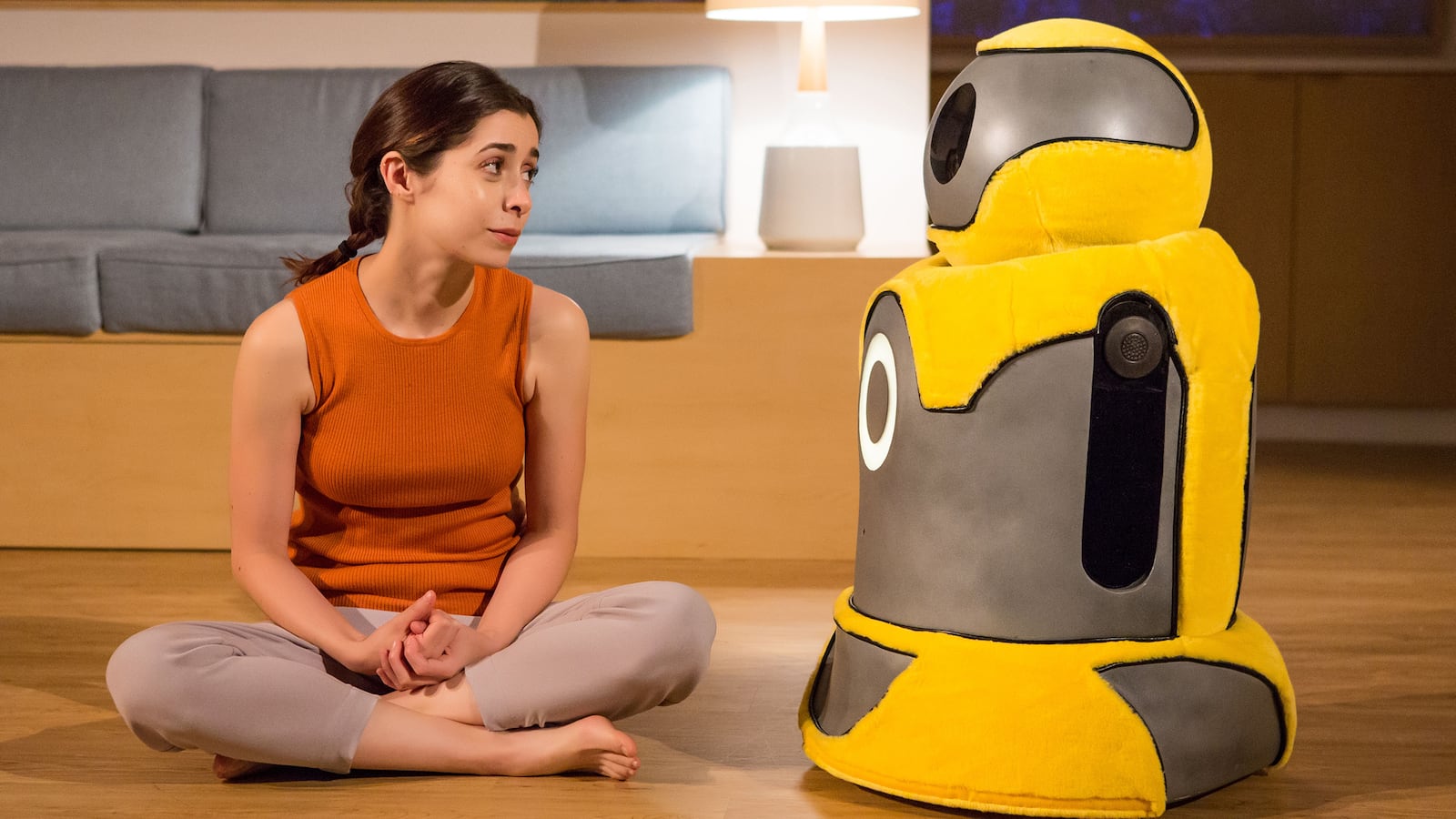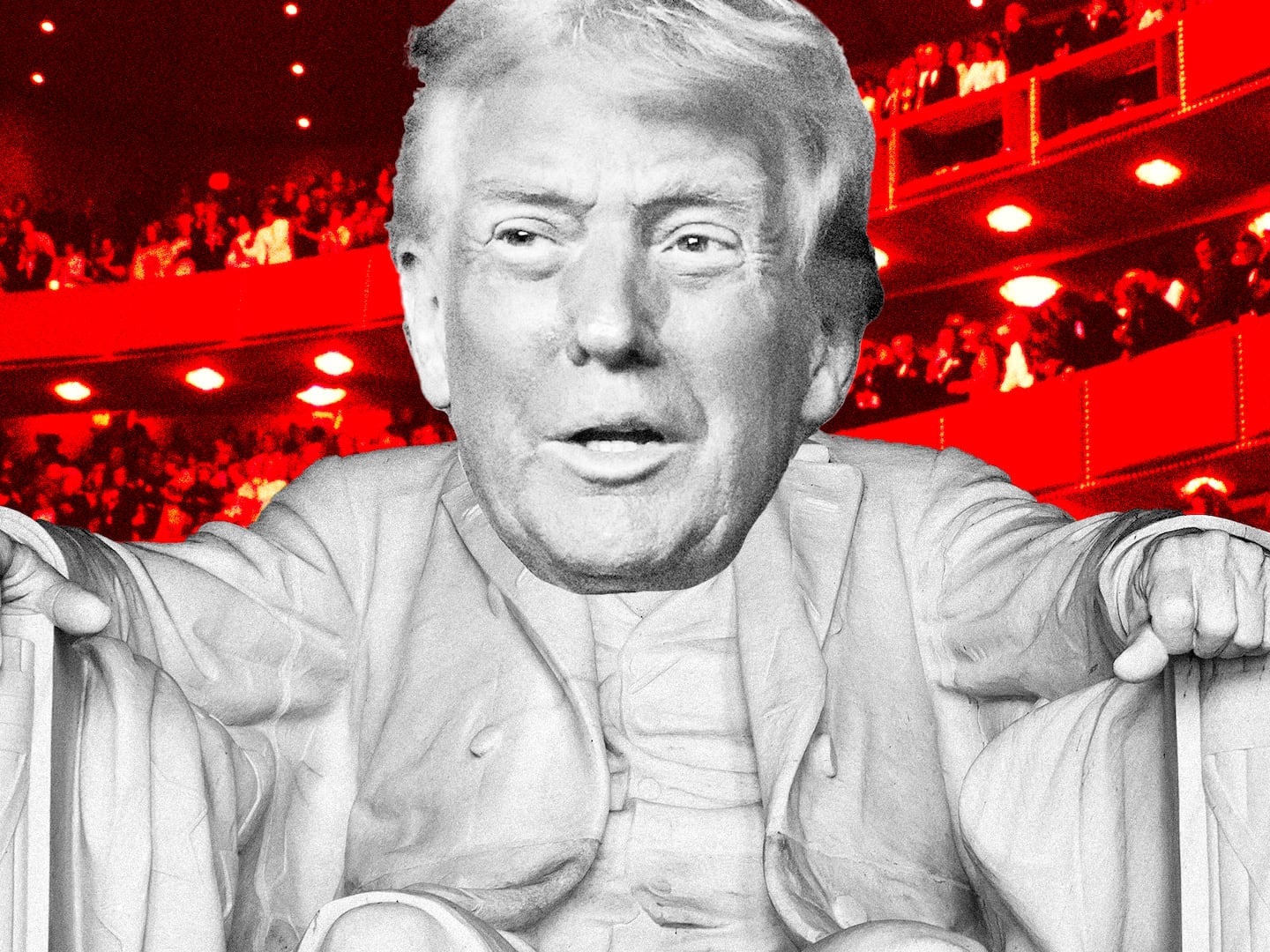In Zoe Kazan’s play After the Blast, set at some point in “the near future,” according to Kazan, there has been an apocalypse, and those fortunate enough to be designated healthy and useful have been sequestered below the ground.
Down there, a new society has taken shape and the windows of peoples’ homes show electronic images of a bucolic countryside (stunning, by Lucy Mackinnon), far removed from what they can actually see outside, because there is no outside. Fertility is regulated. Life is regulated. The horror, which must be warded off, is above ground and out of sight.
Given the devastating scale of the context of the play, you might imagine a correspondingly large stage, but After the Blast, directed by Lila Neugebauer, is being performed at the dinky Claire Tow Theater in New York City’s Lincoln Center, with only two sets by Daniel Zimmerman: a multi-purpose corridor and an imagined living space, which is all tasteful, unadorned functionality.
Whatever does happen after the end of the world, it seems there will be subterranean branches of Ikea. The end of the world will not mean the end of Scandinavian simplicity.
Oliver (William Jackson Harper) and Anna (Cristin Milioti) live in one of this new world’s simple and neutrally pleasant apartments.
Technological advance has sought to ameliorate the worst of not being able to see and experience daylight. One gadget means you can even “sim” experiences—any experience you like. Kazan has a lot of pointed fun at the expense of a humanity made so vulnerable and withered it has retreated to a world of almost complete non-reality. At least in humans’ reliance on gadgets, it is not far from ours, and so as you laugh you do so nervously.
A lot of people “sim” to remove themselves from the strangeness of their plight. You can even “sim” your food, so tasteless globs of whatever can be endowed with whatever taste and flavors you so desire.
But there are certain things, and certain heartbreaks, that “sim-ing” can’t make good, and one is having a baby—which Anna and Oliver very much want, but if and when they have that child is not up to them.
Oliver works in “environmental solutions,” while Anna stays at home, unsure of what to do and who she is. But they seem OK together—they affectionately call each other “Buzzy.” But for Anna, “Nothing feels that meaningful.” She was a journalist, and is no longer. If everyone around her has adapted to life underground, she has not. As isolating as it is, hers is the most horrified, human response.
“If I had been born a hundred years ago, there’s no way I would have been chosen,” Anna says of her life post-apocalypse. “No appreciable skill. Physically weak. Serotonin-deficient. I would have died up there with the rest of them.” She wonders if she would have been better off to have died.
She will not be eligible for fertility treatment unless she passes her mental health evaluation. To cheer her, Oliver arranges for them both to go above ground, where, as Anna tells her friend Carrie (Eboni Booth), there were trees, vines, and sunlight.
Next, into their home comes a robot named Arthur by Anna; the idea, says Oliver, is that he and Anna will train Arthur to be a “helper” for the sight-challenged. The genderless—though we imagine a male because of its voice and name—is the tech-version of a guide dog. Looks-wise, well… if a very fancy vacuum cleaner had sex with an iPhone, Arthur might be the result.
With Arthur’s entrance, a more conventional comedy—human meets robot—takes over. Arthur looks like a little R2-D2 (indeed Oliver calls Arthur that), and the audience I was with cooed at his cuteness, and his dainty wheeling around the stage. It is to Arthur that Anna begins to confess and talk: all of her frustrations, all of the secret feelings she keeps from Oliver. As Arthur is filled with more information and language from the human world, he begins an invaluable source of support for Anna.
Arthur also raises some questions Anna cannot answer: what is it to be a woman; what is her purpose: “People don’t have purposes,” she says. “It’s one of the things that make us different from machines. We aren’t made like you’re made.” It is easier, she finds, to program Arthur to sing, “Islands in the Stream.”
But Arthur’s presence in the house isn’t a benign training program, and soon, secrets and lies mean Anna and Oliver’s relationship is tested to its limit.
The stage is so close and their expressions so visible that the excellent, very natural performances of Milioti and Jackson Harper feel intensely intimate; it is as if we are genuinely intruding on their daily fights, affections, compromises, and complicated feelings. He is charming, but, as it turns out, duplicitous; she is both a frayed bundle of nerves and steely and resolute.
The pair make the best of the conflicting elements of nightmare and comedy in After the Blast. As Anna teaches Arthur and Arthur teaches Anna, you are reminded of E.T., and the touching relationship of opposites that blooms between Elliott (Henry Thomas) and the cute alien created by Carlo Rambaldi. (Just wait for Arthur to flap his little arms.)
In the withholding of information from Anna, and her vulnerability, there are also shades of Rosemary’s Baby and The Stepford Wives. And there is the unseen apocalypse too, the darkly imagined stuff of countless works of literature and episodes of The Twilight Zone, colored here with Kazan’s dry wit and mordancy.
The only jarring presence visually is Arthur himself. With such technological innovation and advancement referenced in the play, this robot appears charmingly old-fashioned. R2-D2 was flashier, but Arthur—voiced by Will Connolly, designed by Noah Mease, and constructed by Acheson Walsh Studios—shares R2’s charm, even if, as he tells Anna, he does not feel emotion.
Of course, this is a play, not a big-budget Hollywood film and so it would be wise to temper one’s tech-expectations. Also, Arthur—as well as being made of metal—has a very nifty yellow sweater/scarf/jacket, which only accentuates his sweetness.
The play, in some ways, feels beached between a dark portrait of post-apocalyptic life and a relationship on thin ice, and a comedy about a cute robot entering the domestic realm. It settles, far from detrimentally, for being all of those things and at a time when the possibility of the end of the world feels disconcertingly present.
Although the “sim-ing” and other tech-innovations of After the Blast are fun and shiny gimmicks, what Anna and Oliver ultimately face are harder and more traditional questions of trust and commitment.
Even underground, after an apocalypse, we would put what remained of our faith in our loved ones, and After the Blast confronts what happens when that trust is abused. In a post-apocalyptic world, Kazan suggests, all the old questions about love, connection, and family remain, and so do the most traditional themes facing the playwright.
After the Blast is at the Claire Tow Theater, Lincoln Center, until Nov. 19. Book tickets here.






